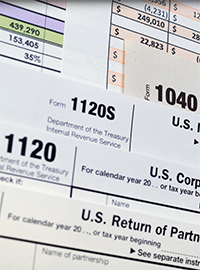This week, convicted former Internal Revenue Service (IRS) contractor Charles Littlejohn received the maximum five-year sentence for leaking the tax returns of Donald Trump and other Americans to The New York Times and far-left activist organization ProPublica.

Littlejohn, who drifted between employment stints at powerful government contractor Booz Allen Hamilton and returned in 2017 with the specific purpose of breaching and leaking Trump’s private IRS tax information, symbolizes a recurring threat to all Americans, not just Trump. He is the prototypical left-wing activist populating our upper reaches of federal power, who considers legality and the privacy rights of everyday citizens no impediment to larger partisan crusades.
He is also just the latest example of someone leveraging the IRS or other government agencies to target private citizens to advance a left-wing agenda.
Recall former IRS director Lois Lerner, for example, who deliberately subjected conservative and pro-Israel nonprofit organizations to illegal discrimination and persecution. Or recall how the IRS improperly disclosed lists of private donors to the National Organization for Marriage in 2008, and less than a decade later in 2015 allowed hackers to breach its records, which led to the theft of personal data on 100,000 private taxpayers.
Or consider how the same ProPublica that assisted Littlejohn’s criminal leaks accessed and illegally leaked thousands of Americans’ IRS tax returns spanning several years, thereby exposing sensitive personal information to innumerable other hackers or partisan extremists.
One might reasonably assume that the IRS’s record of failure and outright malfeasance would persuade even hardened partisans of the left to rein in IRS authority in order to reduce the potential for future abuse. The Biden Administration, however, naturally sought from day one to amplify the IRS’s power rather than check it. Specifically, its signature legislative effort boosted IRS funding by $80 billion, which was six times its annual budget of $13 billion, in addition to adding 87,000 new agents.
Meanwhile, Biden’s left-wing accomplices in Congress continually seek legislation that would force private citizens to report private donations to nonprofit organizations to the IRS. That would instantly risk exposing donors’ personal and political beliefs to potential hackers and criminal IRS agents, which creates a chilling effect contrary to a unanimous Supreme Court ruling in the seminal case of NAACP v. Alabama (1958), where government officials sought to expose NACCP supporter lists:
This Court has recognized the vital relationship between freedom to associate and privacy in one’s associations. Compelled disclosure of membership in an organization engaged in advocacy of particular beliefs is of the same order. Inviolability of privacy in group association may in many circumstances be indispensable to preservation of freedom of association, particularly where a group espouses dissident beliefs.
The sheer amount of sensitive information collected by the IRS creates an ongoing danger for every American whose data it possesses. Nonprofit organizations, especially those involved in advocacy and ideological causes, appeal to citizens who prefer to remain anonymous due to fear of targeting or persecution, as has so often been the case. That creates a chilling effect of the very sort addressed by the Supreme Court in NAACP v. Alabama. The more data the IRS accumulates, and the more personnel it employs, the greater the risk of exposure and illegal behavior, jeopardizing Americans’ fundamental individual freedoms.
Indeed, the reactions from The New York Times and ProPublica to Littlejohn’s conviction and sentencing confirm the ongoing menace that they and others like them pose.
For its part, The New York Times acted as though Littlejohn was the victim, not the criminal. “We remain concerned,” it said, “when whistleblowers who provide information in the public interest are prosecuted.” Never mind that it was illegal to access and disclose that information. It added that Littlejohn offered “information that has long been seen as central to the knowledge that voters should have about the leader of our government and the candidates for high office.”
Well, if they’re Republicans, that is. If the candidate in question is Joe Biden, that logic obviously doesn’t apply.
Meanwhile, ProPublica insisted that Littlejohn “deserves protection, not prosecution.”
All of this proves that the activist left has not learned its lesson, and will not correct course in the wake of Littlejohn’s conviction.
It’s therefore up to Congress, the courts and the American people themselves to insist that the IRS’s authority is restrained, not amplified.
